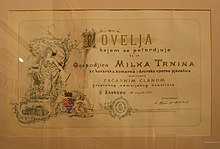Milka Ternina


Milka Ternina or Milka Trnina (December 19, 1863 – May 18, 1941) was a Croatian dramatic soprano who enjoyed a high reputation in American and European opera houses. She was blessed with an outstanding voice, an exemplary singing technique and remarkable interpretive powers, but her career was cut short in 1906 by a chronic medical condition.
A native of Vezišće, Ternina studied singing with Ida Winterberg in Zagreb and with Joseph Gänsbacher in Vienna. She made her operatic debut while still a student in Zagreb, singing Amelia in a production of Giuseppe Verdi's Un ballo in maschera. Anton Seidl soon recommended her to replace Katharina Klafsky as principal soprano of the opera in Bremen.
Ternina was engaged by the Munich Royal Opera in 1890; for a decade she distinguished herself there as an outstanding interpreter of the works of Richard Wagner. Other German cities in which she sang during the 1880s and 1890s included Leipzig and Bremen. Her American debut took place in Boston in 1896, when she sang Brünnhilde in Die Walküre with the Damrosch Opera Company. In 1898, she appeared for the first time in London as Isolde in Tristan und Isolde. Her London appearances would continue until 1906. Ternina's only appearance at the Bayreuth Festival occurred in 1899, in the role of Kundry in Parsifal.
On January 27, 1900, Ternina made her debut at the Metropolitan Opera as Elisabeth in Tannhäuser. During her subsequent association with the Met she sang Kundry in Parsifal's first United States performance; as this staging of the opera went against the express wishes of the Wagner family, she was denounced and never again invited to Bayreuth. Ternina also sang the title role in the New York premiere of Puccini's Tosca. (She was London's first Tosca, too.)
In 1906 Ternina suffered an attack of facial paralysis. The ailment lingered, leading to her retirement from the stage at the height of her powers. For a year she taught singing at the Institute of Musical Art in New York City, after which she withdrew from the international music scene and returned to Zagreb to live. She was credited with the discovery of soprano Zinka Milanov during this period. Ternina died in Zagreb in 1941.
Unfortunately, Ternina did not make any commercial recordings of her voice. (Fragments of her singing can be discerned dimly, however, on Mapleson Cylinders recorded live at the Met at the beginning of the 20th century.) Nevertheless, despite the lack of an acoustic legacy, her name lives on, such was the great vocal and histrionic impact of her interpretations. She had a repertoire of 85 roles and her performances of Isolde, Tosca and Leonore in Beethoven's Fidelio were considered unequalled in her day.
References
- David Ewen, Encyclopedia of the Opera: New Enlarged Edition. New York; Hill and Wang, 1963.
- Harold Rosenthal and John Warrack, The Concise Oxford Dictionary of Opera, second edition. London; Oxford University Press, 1980.
- Richard Somerset-Ward, Gods and Angels. New Haven and London; Yale University Press, 2004.
